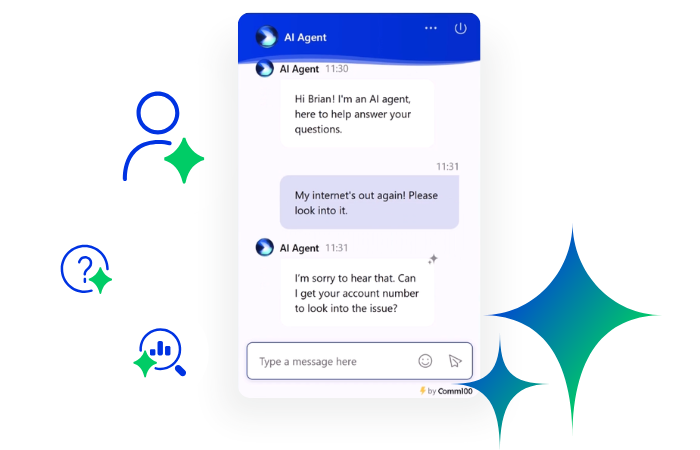Once you have interviewed and selected the newest members of your live chat dream team, it’s time to begin integrating them into their positions as live chat agents. You know that these people have the right skills to serve your customers and go far within your company – now what tools are you going to offer to help them reach their full potential?
If you answered, “I’m going to create and implement an employee onboarding program,” congratulations, you’ve come to the right place! We’re going to give you some tips on how to do just that. If you aren’t quite familiar with new hire onboarding, don’t worry. This blog post will cover everything you need to know about why and how to set up your very own customer service onboarding process.
What is Agent Onboarding?
You may have heard of customer onboarding – a term which refers to the overall journey that a customer takes before, during, and after they purchase your product. This journey includes several milestones, such as:
- When a visitor is targeted as a lead
- When a customer makes a purchase
- When a customer starts to reap the value of your product
- When the customer becomes loyal to your company
Customer onboarding prevents customers from ditching their purchase, and/or bringing their business somewhere else. It is meant to guide the customer experience towards satisfaction, and remedy any speed bumps your customers may encounter.
Similarly, agent onboarding functions to help your new hires become satisfied, contributing members of your customer service team as quickly as possible. It aims to keep your new hires invested in the company, and provide them with valuable resources to help maximize their effectiveness.
Employee onboarding is a comprehensive, ongoing process involving both management and new hires that can last anywhere from three months to a year. During this process, your live chat agents will learn the following:
- What they can expect from your company
- What the company expects from them
- What resources are available to them
- How management will support them
Effective agent onboarding accompanies new live chat agents from the interview stage, all the way up until they have reached their full productivity, and are experts in the company process and product.
What Are the Benefits of Installing a Live Chat Onboarding Program?
Research shows that nearly one out of three new hires look for a new job within their first six months on the job. Among Millennials, that percentage is thought to be even higher. A recent Gallup report on the millennial generation reveals that 21 percent of millennials say they’ve changed jobs within the past year, which is more than three times the number of non-millennials who report the same.
An effective live chat onboarding program will help your new hires become engaged with company culture, and reduce the risk of a quick turnover. A well-planned onboarding program will also reinforce your company’s commitment to helping employees grow, and foster a supportive relationship between new hires and management. The result is increased confidence and job satisfaction amongst live chat agents.
Customer service onboarding programs also prevent your new hires from going out into the world of customer service unprepared. This can help prevent any major faux pas in your new hires’ first months, and helps ensure the that your customers receive superior service. An onboarding program can include KPIs that work well in conjunction with a typical probation period too – this allows you to establish clear expectations and goals.
Live chat onboarding can even save your company money several ways:
- Subtly – with higher agent productivity
- Quantifiably – a low turnover rate saves you the cost of having to recruit, hire, and train new agents, should your agents quit. Also, in the U.S. and U.K., an estimated $37 billion is spent annually to keep unproductive employees who don’t understand their job. Quality onboarding will help your company avoid this loss.
Creating Your Own Live Chat Onboarding Program
To create your own effective onboarding program, be sure to take the following steps:
1. Plan Ahead
Contrary to what you may have heard, onboarding doesn’t start on an employee’s first day. According to Erin Perry, Vice President of Global Solutions at Cielo, a successful onboarding program actually begins during the recruitment and hiring process.
Your company can begin the onboarding process before a candidate even steps foot in your building by including ample information about the position requirements, your workplace, and your company culture in the “Careers” section on your website. Richard Jordan, a business coach who has been responsible for reshaping the recruiting and orientation process at a number of technology firms, is a fan of this technique. He says that onboarding “should begin at the first click of the mouse when someone first goes on the company’s website, so by the time the person comes in for the interview, they already know quite a lot about the organization.”
By planning ahead and making relevant information easily available to your candidates during the application process, you are more likely to attract live chat agents who are aligned with your company’s goals and culture, and who are more likely to become highly productive employees.
2. Prepare A Written Statement of Responsibilities
By the time you begin the interview process, your candidates should have an idea of what will be expected of them in their new position. However, maybe your candidate doesn’t remember the information that they read on your site (after all, they might be applying to several jobs at once). Or maybe there was something about the list of job expectations that they didn’t quite understand.
Writing out what is expected of your new hires as far as their responsibilities will help avoid any confusion about the roles and/or tasks that they are being assigned. This also gives new hires something that they can look back on once they are a part of the team, should any doubts arise.
By having this information available during the interviewing process, you will be able to ensure that there is no misunderstanding about the position. If you give your candidate the written statement of responsibilities during the interview, make sure to give them another, or to check to make sure that they still have this written statement on their first day. If you don’t have the candidate’s responsibilities in writing at the time of the interview, make sure to work it in verbally. The candidate should fully understand and agree to the responsibilities that you have in store for them before coming aboard.
A written statement of responsibilities should include how your new agents’ performance will be assessed, so that your new hires will have goals to work towards. This includes any key performance indicators (KPIs), and what the benchmark is within your organization.
3. Keep Your Other Agents in the Loop
Nobody likes to show up to the office on their first day feeling out of place, or unwelcome. Before your new hires come in, let your supervisors and current agents know that they are coming. By encouraging your current staff to give these new agents a warm welcome, they will begin to feel like an important part of the team – not an afterthought – from day one.
Once your new hires come in, introduce them to their fellow live chat agents and their supervisors. Point out who they can go to for help, and ask these identified agents to lend a hand when needed. Another great strategy is to introduce your new hires to other relevant teams that they may need to interact with. Establishing these relationships outside of the immediate team is vital, both from an everyday working point of view and also in the sense that it’s great for encouraging a culture that’s not isolated.
4. Make the First Day Count
By the time your new hires come in for their first day, several workplace elements should have already been taken care of. Here are some of the things that you should take care of before your new hires’ first day:
- Plan where your new hires will be seated; clear and set apart their desk. A new hire who comes in without a desk ready for them will feel like an afterthought, and may feel uncomfortable as a result.
- Make sure that desks, seats, and monitors are appropriately sanitized and set up – this is important from a health and safety perspective.
- Set up their computer, login information, email, and live chat systems before they walk in. This will save your new hires from having to wait around on the first day while someone from the tech department fiddles with the machinery.
- Set up video chat and/or phone systems if necessary.
Once your new hires arrive, it’s time to make their first day count. Here are some of the basics that you should take care of and/or introduce your live chat agents to on day one:
- Fill out any first day paperwork such as payroll, etc.
- Take new hires on a tour of the building (show them where bathrooms are, the break room, the cafeteria, etc.). Clear up any parking doubts, explain how breaks work, and give any other relevant information.
- Give new hires a training schedule showing how the next few weeks will work, especially if you’re planning classroom training, so they know what to expect (or, just tell them how the next few weeks will work).
- Touch upon live chat customer service basics and provide resources to further this knowledge.
- Provide resources to help develop product and business knowledge.
- Introduce new agents to the system, and start teaching them how to use it.
- Introduce new hires to their fellow agents, supervisors, and other personnel.
Taking care of these elements will make for a productive, successful first day, and will get your new hires started on the right track.
Powerful live chat software
Offer real-time, personalized, efficient support that your customers and agents will love at 1/3 the cost of voice support.
Learn more
Comm100 Live Chat
5. Use a Buddy System
Two heads are better than one… especially when you’re getting ready to turn a new hire loose on your customers. Choose a responsible agent to buddy each new hire with, and seat your new hire next to him or her. Assign them with the task of assisting with orientation or acclimation. This may initially involve your new hires shadowing your seasoned agents, and eventually will lead to the experienced agents watching while the new hires try the system out for themselves.
Make sure that the experienced agents that you are choosing for this buddy system are good role models for your new hires. Ideally, these agents should be people who is positive, helpful, and attentive.
Using a buddy system also initiates the socialization process, and helps your new hires become comfortable with someone on the team, who they can reach out to in the future.
6. Involve Supervisors and Management
An important part of new hire onboarding is involving supervisors and management in the process. This is essential, especially in the early days of onboarding, and sets the tone for a positive, present relationship with management.
If you are going to be on vacation, on a business trip or immersed in meetings, then it is not a good day to have new hires come in. Make sure that your new agents’ first day is a day when you can be there for them, to offer any support they might need, and establish your presence. As John Sullivan, professor of management at San Francisco State University, puts it: “The worst thing you can do is have new hires show up when their immediate supervisor isn’t there for three or four days. It’s like getting married and not having your spouse on your honeymoon.”
By being present and giving constant, caring input, you can show your new hires that they are valued and that their work is appreciated.
7. Always Give Feedback
Part of the importance of involving supervisors and management in the customer service onboarding process is the need to give your new live chat agents feedback.
From their first day on the job, you want your new hires to become used to receiving feedback. Correcting mistakes in real-time is vital to preventing any slips in customer service quality. It is also necessary so that your agents can learn the right way to do certain processes from the get-go, and not need additional correction down the line.
Normalizing feedback is also essential so that your new agents don’t feel personally attacked by, averse to, or above any constructive criticism that you need to give them in the future.
8. Encourage Socialization During Breaks and Lunch
Socialization is an important part of helping a new hire feel acclimated with the team. In fact, studies show that the secret to happy, engaged, high-performing employees might be as simple as having close relationships with colleagues. According to a 2015 survey by Virgin Pulse, 40 percent of respondents indicated their co-workers as the top reason they love their company. 66 percent said these relationships positively impact their focus or productivity at work, and 55 percent said that these relationships positively impact stress levels on the job.
And the closer the relationships, the better. A study by Gallup shows that employees who have a best friend at work are seven times more likely to be engaged than their less socially-connected counterparts, and are thriving in their careers nearly 50 percent more.
Part of your onboarding process should be helping your new hires begin to invest socially in your company. You can start this process during your new employees’ first few days, by encouraging the other agents to create a friendly environment for new hires.
Encourage seasoned agents to invite new agents to sit with them at lunch, or to chat with them during a break. Consider going the extra mile, and having a team lunch to welcome them. Also, consider meeting up with your team for dinner and drinks outside the office, to show the importance of social connection in and out of the work atmosphere.
These steps will help your new hires feel more at ease, and will give them more people to turn to should they need help with a live chat situation.
9. Use Games Smartly
During the onboarding process, games can have many functions. They can help new hires learn the names of their co-workers, and become more comfortable socializing and interacting with them. They also make the onboarding process less dry, and more entertaining for everyone.
Try spicing up your onboarding process with selective games, friendly competition, and a reward system to help your new hires get in the swing of things. Alternately, you can even try presenting the entire onboarding process as a game. Consider having certain goals that your new hires need to reach in order to “level up,” Once they reach these goals, you may want to offer a reward, or verbal congratulations and/or acknowledgement.
This will help your new hires get in sync with your team faster, and will also show them that you have a professional but playful company culture.
10. Personalize Your Onboarding Process
Different people respond best to different management techniques. As you embark on your employee onboarding journey, ask your new hires questions that will help you tailor the onboarding process to fit their individual personalities and needs. Questions that you might want to ask include the following:
- What is important to you? What are your own personal goals that you want to achieve during the onboarding process?
- What sort of management style do you personally prefer?
- How do you like to receive your feedback? A) Gentle: I just need a light nudge in the right direction – give me your feedback, but consider how it will affect me. B) Moderate: I like professional, straightforward feedback, that sends the message that it needs to. Just try not to go too hard on me. C) Harsh: Criticism makes me stronger. I respect brutal honesty and I can take anything.
By asking these questions, your new live chat agents will know that you care about them, and will be more motivated to succeed as a result. You may also want to tell your new hires a bit about yourself and your leadership style, so that they know what to expect from management as well.
To further acquaint yourself with your new hires, consider having them complete a learning styles test such as Honey and Mumford’s Learning Styles Questionnaire. This helps you understand how your agents learn best so that you can adapt training accordingly. Based on these test results, you can provide activities that your new hires can learn most easily from, or activities of a different type to challenge them.
11. Check the Metrics
Once your new agents are ready to interact with customers on their own, you are going to need to implement quality control by periodically reviewing their live chats. You can view live chat transcripts live as they are happening, or go over each new agent’s live chat history. This is necessary to ensure that your customers are getting the best experience that they can, and that any mishap is corrected immediately before it becomes habit.
It is also important that you check agent metrics to measure productivity. Are your new hires where they should be at this point in the onboarding process? If not, why is that? Is there something that needs to be addressed with a specific new hire? Or is it a matter of unrealistic goals that require a bit of reevaluation on your end?
12. Get Feedback
To know whether your customer service onboarding program works, you need to get feedback from your team. Ask your current agents how the onboarding process worked for them, and how it can be improved. Pick their brains for any creative new onboarding ideas.
You should also ask for and consider onboarding feedback from your new hires. Ask them how their process of getting settled into the company is going. Is there anything they are missing? Do they have all of the necessary tools to succeed? How engaged do they feel? How important do they feel to your company? During what steps of the process could your company improve?
Be sure to ask for feedback at each stage of onboarding to make sure that everything is going smoothly. Some teams take up a 90-day onboarding plan, where every 30 days the goal shifts, and the bar is raised. Surveys show that it takes eight months on average for a newly hired employee to reach full productivity – you want to make sure that you are reaching out to your agents regularly to help them reach full productivity as soon and as smoothly as possible.
Conclusion
As Erin Perry, Vice President of Global Solutions at Cielo, wisely puts it: ‘Your employees are going to get orientated whether you plan for it or not. But if you do plan it, it’s a lot more likely to be successful.”
By creating a prepared, well-crafted agent onboarding program, your customers, new hires, and your team will all feel the effect: right now, months, and even years down the line.
Download now: Ultimate Guide to Building a Live Chat Dream Team
This comprehensive eBook contains everything you need to know about hiring, interviewing and training your live chat team – whether they’re in the same office as you, or remote workers.
Download now
eBook








